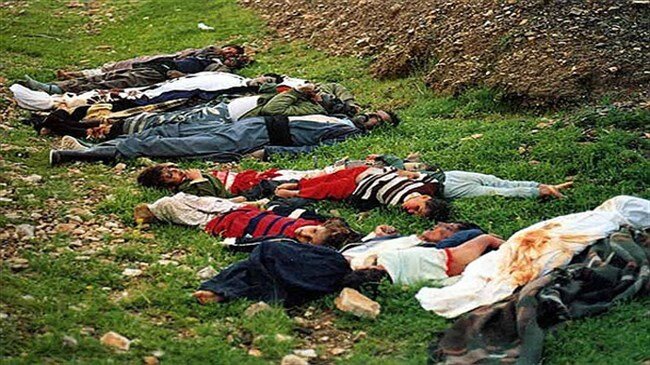In late September 1980, Iraq invaded Iran, triggering a bitter eight-year war that destabilized the region and devastated both countries. The then Iraqi dictator Saddam Hussein claimed a territorial dispute over the Arvan Rud, the waterway which forms the boundary between the two countries as a reason for the invasion.
During the War, Saddam Hussein, who was backed by several western countries, including Germany, France, the US, and some Arab Monarchies of the region waged several chemical attacks on Iran’s cities, leaving behind many victims who are still suffering after decades.
In June 1987, the Iraqi Air Force targeted four most populated areas of Sardasht in West Azarbaijan province of Iran with chemical bombs. The attack on the city immediately martyred about 130 people and injured thousands of others. Sardasht is the third city in the world after Japan’s Hiroshima and Nagasaki which became the target of weapons of mass destruction. Unfortunately, many citizens of Sardasht are still suffering from negative effects and consequences of this attack. But, despite this awful crime, international circles did nothing to halt the continuation of the invasion and even did not blame the Iraqi regime for that and instead, ignored it as before.
Around 200,000 Iranians were martyred during the eight-year war which is imposed by Iraq's dictator to Iran.

To know more about the reasons behind Saddam's aggression on the Islamic Republic of Iran and the support of some European countries for his regime, we reached out to Anthony Tucker-Jones, former British defense intelligence officer.
Following is the text of our interview with him:
What were the goals of former Iraqi dictator Saddam Hussein of starting a war against Iran?
Saddam hoped war against Iran would trigger an uprising against Ayatollah Khomeini, result in restoration of Iranian royal familySaddam Hussein planned a swift campaign to seize control of the Shatt al-Arab Waterway and the oilfields of southern Iran. He hoped this would trigger an uprising against Ayatollah Khomeini and result in the restoration of the Iranian royal family. Instead, he sparked a terrible eight year long conflict that became known as ‘the war without end.’
As you know, some European countries, such as Germany and France, supplied Saddam's regime with chemical weapons that he used against his own nation and the Iranians. What was the reason for such support from those countries for Saddam's regime?
Saddam used chemical weapons as a way of breaking up Iran’s massed infantry attacks Many countries feared and thought the Iranian Revolution would be exported and therefore saw Saddam Hussein’s Iraq as the lesser of the two evils. This resulted in him being supplied with billions of dollars of weapons that only served to prolong the war. Saddam lacking the manpower of his larger neighbor resorted to using chemical weapons as a way of breaking up Iran’s massed infantry attacks and as a way of defeating the Kurdish guerrillas. It has been estimated that up to 100,000 Iranian soldiers and civilians were gassed. The international community while publicly deploring this, shamefully did nothing to stop him.
Despite the arms and political support of most powerful countries for Saddam, shortly after his invasion of Iran, Iran was able to step out of its defensive position and take the initiative and make extensive progress. What do you think was the reason?
Along with the Revolutionary Guard Iranian armed forces were able to turn the tide against Saddam’s blitzkriegSaddam Hussein very badly underestimated how quickly the Iranian armed forces would take to recover from the chaos of the Iranian Revolution. He assumed his attack would cause it to completely collapse leaving Iran at his mercy. This proved to be a fatal error. Instead along with the Revolutionary Guard, they were able to turn the tide against Saddam’s blitzkrieg. Once this happened Iran was able to take the fight to Iraq. The Iran-Iraq War then became a conflict of attrition with both sides fighting each other to a standstill.
Anthony Tucker-Jones, former intelligence analyst spent nearly 20 years in the British Intelligence community before establishing himself as a respected defence writer and military historian.
Interview by Zahra Mirzafarjouyan
